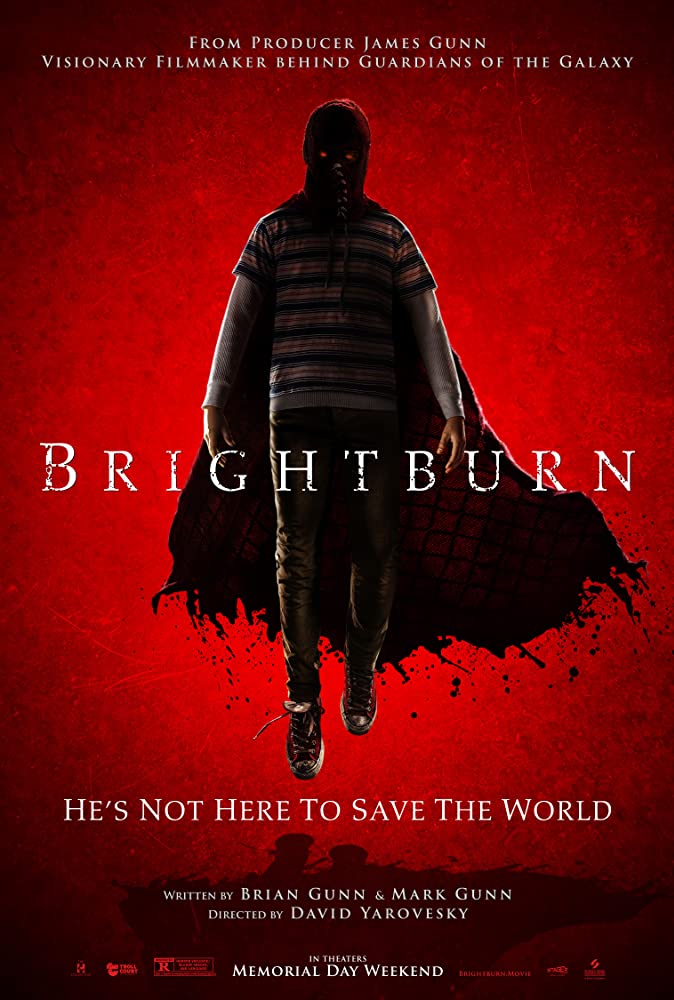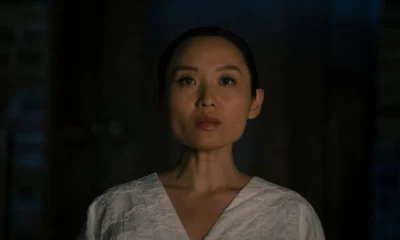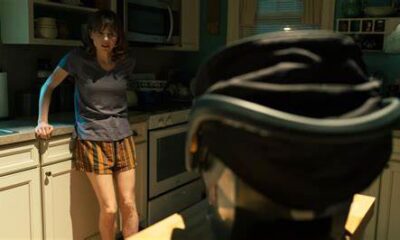
‘Brightburn’: Supervillain Origin Story That Gets Gory
David Yarovesky’s Brightburn is sort of underrated, and I suppose that’s better than being overhyped. Still, I do recommend checking this movie out. Like Amazon Prime’s The Boys or even the good old-fashioned X-Men, Brightburn is a solid reminder that superpowers would be scary. After all, aren’t people potentially deadly enough as is? Give them any sort of power and some of them will surely abuse it. In that respect, I think nearly any story with such thematic elements wins a point or two. It actually is food for thought, and nourishing food at that.
I hesitate to call Brightburn a genius movie, but it is intelligently done. For example, parents Tori (Elizabeth Banks) and Kyle Breyer (David Denman) immediately hide the spaceship their son Brandon (Jackson A. Dunn) arrived in. While this is similar to Superman’s origin story, it ends up taking dark turns before very long. The parents seem to know the townspeople wouldn’t be so delighted to see that bizarre ship. Also, the Breyer family attempts to lead the life of a “normal family,” but it’s inevitably a tale of a bizarre family gone awry. Normal discipline cannot work with a child who knows he’s invincible, can it? While I don’t know if this qualifies as cult films, a story of a superpowered maniac has its appeal.
Rating: R. Definitely an R
Many movies can be rated R for mild violence. Hell, even some considerably violent films get a “hard PG pass.” However, there’s no denying that Brightburn is an R-rated and ultimately bizarre funhouse ride. While X-Men’s Logan delighted in dropping F-bombs at every opportunity, Brightburn ends up heavily caked in blood and some disturbing images. Horror fans should not be too disappointed. In fact, this movie has some gross-out moments that’ll make you say, “Offensive language who? Sexual content what?” The violence is effective and definitely part of the story. Think of a young, superpowered Ted Bundy.
‘Brightburn’ Avoids Being Too Nerdy
I’m capable of being nerdy here and there, so I’m not going to judge too much. Still, I appreciate this movie for not layering on endless superhero and sci-fi themes. They are present at times, but it’s not exactly an homage-fest. It is a supervillain movie that stays down to earth. At no point does Brandon re-enter his ship to be pursued by a group of space pirates, or any corny shit like that.
The baby and ship have a bizarre connection, but it’s more Satanic in nature than anything related to laser-blasters and space mutants. Brightburn is on its way to somewhere else. It’s more “Omen-style than Jedi-style. One could imagine Brandom drafting some Death Star plans, but this is no Skywalker, Obi-Wan, Yoda, Wookie cookie-cutter rip-off clusterfuck.
Brightburn’s Possible Kryptonite
This movie experiments with the effects of power on the human mind. Or does it? There are signs throughout that Brandon may be possessed by soem evil force outside of himself. Honestly, I think this movie loses something because of that. You see his twisted pictures that he draws, but at times one wonders if they’re coming from his own mind or that wretched spaceshit. What caused him to hear the music of evil and dance? What allowed him to open a door, to pass that point of no return? I would like to think it was the nature of his power itself, or the idea that “No one can possibly stop me if I misbehave!”
However, that possible message gets confused with all these weird whisperings of evil scattered throughout. At that point, I’d prefer if he slipped and fell on the floor, triggering an accidental shift in personality after a brain hemorrhage (or something like that). Instead, audience might say, “Oh, Brandon is possessed by the alien space-demon by now. Okay.” See the difference? This also opens the door to the movie becoming cheesier in a sequel. Maybe he sees numerous alien planets, and also a David Hasselhoff-type confronting him about his evil ways.
Maybe the Hasselhoff-like hero can have a similar backstory; While playing around with the alien world, he gains his power and ultimately, an android. In other words, a sequel could very easily lose its horror edge by being too mystical and magical, or even too immersed in superpower dynamics. It’s a bit of a tightrope.
Final Thoughts: Where Brightburn Burns Brightest
This movie successfully blends a Superman-esque origin story with a “Don’t open the cellar door” vibe, while threatening to re-open the stab wound we’ve received by years of unworthy-hero worship. In reality, Superman is dead to some of us, and probably deserves it. The Fortress of Solitude falls into ruin and leaves him depressed, because being too self-virtuous and powerful is an easy pathway to villainy (which, interestingly, is why Batman fought Superman anyway). A real Superman would surely have many former friends and a growing supply of enemies, whether he’s earned them or not. After all, isn’t that why the identity’s secret to begin with?
These elements are lightly brought out here. In the movie itself, Tori, the loving mom, grants her child all the love and respect she can muster, but it’s not going to be enough, and it almost leads her to covering for his abuses. His dream come true is everyone else’s nightmarte, and the couple is not to live happily ever after. While the idyllic newfound “normal” life seems true at first, reality spills out, leaving everyone distraught and in mortal danger. That’s right with the horror tradition, and this movie’s more original about it than some critics are giving it credit for.
What are your thoughts on Brightburn? Let us know in the comments!
Movies n TV
Wheel of Time A Question of Crimson Is a Political Espionage Delight
Episode two of Wheel of Time felt like the beginning of a long journey. Stories are unfolding, lives are changing, and blood is spilling.
Let’s discuss.
The story
We begin this episode in the past with Elayne’s mother, Queen Morgase. It turns out her rise to the throne was a bit, shall we say, cutthroat. So when she shows up at the White Tower, Siuan is concerned.
She might have reason to be, too.
Meanwhile, Rand, Egwene, Moiraine, Lan and Aviendha are in the Spine of The World. As they travel through some of the most breathtaking lands I have ever seen on a TV show, Egwene is plagued with nightmares. We think at first that’s just her trauma working itself through her system. But we soon find out that it might not be that straightforward.
Finally, Perrin returns home to heal after his hand is almost cut in half. But when he gets there he finds the town has been infested by Children of The Light. And they’re looking for him.
What worked
There was something heartwarming in this episode about political espionage and choking religious persecution. And that is Elayne’s relationship with her family.
I have consumed a lot of fantasy content with royal families. And I have never once heard a princess call her mother ‘Mum’. I’ve never seen royal siblings get along. And I have sure as hell never seen a princess have a good relationship with her step-parent.
This was refreshing. Even though Queen Morgase is kind of a horrible person she seems like a good mother. And that’s an unexpected delight.

Of course, this is just one storyline among many. And while this can sometimes be overwhelming, in this case it wasn’t.
I’ll be honest, some of these storylines are going to drag for me. I know this because I’ve read some of the Wheel of Time books and I have an idea that not all the characters exactly pique my interest.
No one likes all the characters. No one likes all the storylines. While I am here for the political espionage between Queen Morgase and Siuan, not everyone likes it. While others might be fascinated with Selene trying to win Rand back, I couldn’t care less.
Having multiple storylines keeps everyone’s attention better. So long as things don’t get out of hand. Things can easily get out of hand. But this seems to be managed well.
So far.
What didn’t work
As I mentioned above, I’m not thrilled with Rand’s story at this point. And while it’s fine to not like a storyline when there are this many to choose from, it’s not fantastic that the one I like the least is the one involving our two main characters. And anytime we were with the team at the Spine of The World, the only thing that brought me joy was Moirain’s hat. It reminded me of Stockard Channing’s hat in Practical Magic.
The problem is that Rand is Charlie Brown with controversial magical powers. He is boring, serious, and pessimistic.
And yes, I understand that he has a heavy emotional burden and he’s the Dragon Reborn and that’s quite taxing and all. But let’s be fair, there isn’t a single person in this show that doesn’t have a heavy burden. And most of them manage to be fun occasionally.

All that being said, this episode of Wheel of Time did exactly what it needed to do. It set up conflicts at each of the three locations. It established emotional ties between the characters and the events. And it established goals for everyone.
This was, in short, a solid episode. Not groundbreaking, not mind-blowing or life changing. It was simply good. It was entertaining and moved the plot forward.
Well done.
 (3.5 / 5)
(3.5 / 5)
Movies n TV
Wheel of Time Returns With A Bang
Wheel of Time is back for season three. There are mixed feelings regarding this. Last season, there were some serious pacing issues. And some serious sticking to the book’s storyline issues. But we’re two seasons in, and we don’t give up so easily. So let’s dive into episode one, To Race the Shadow.
By the way, I highly recommend watching this episode with the subtitles on. You’ll see why.
The story
We begin this episode with Liandrin facing a trial of sorts for her rampant betrayal. She does her best to gaslight her Aes Sedai sisters into thinking that Siuan Sanche is the real traitor.

When that doesn’t work, she reveals how many Black Aes Sedai have actually infiltrated the tower.
Spoiler, it’s a lot.
In the aftermath, our whole team gathers to drink and enjoy one night of relaxation before they head out to the Tear to form an army for Rand. All is going well until they’re attacked by myriad creatures and a sentient axe.
What worked
This episode was long. It had a run time of an hour and eleven minutes. And a lot of that run time was spent in heavy dialog scenes.
Fortunately, these were well-done scenes.
If you’re going to have a lot of talking scenes, there are good ways and bad ways to do it. Last season, we saw lots of examples of the bad way to do it. But this episode did it well. For one thing, other things were going on while conversations were taking place. The characters are drinking, playing games, walking through an interesting city. And the scenes themselves didn’t stretch out. They weren’t repetitive. We heard what the character had to say, then we moved on.
It was also nice that the point of these scenes wasn’t just info dumps. We had character development. We had romantic interactions. We had plot development and foreshadowing.
Overall, this episode felt like what it was. A moment of calm before a storm.
Taking a step back, I’d be remiss if I didn’t address the fight scene at the start of the episode. Because it was epic.
The magic looked amazing. The martial arts that went along with it looked fantastic. The costumes were beautiful. It was just incredibly fun to watch.
More than that, it was emotional. We lost some characters in that fight that were important. And it was clearly emotionally shattering for many of our characters, who found themselves betrayed by people they trusted.
So many of them.
It was a great way to open the season.
What didn’t work
Despite that, this episode wasn’t without its flaws.
First off, there were a lot of dialog scenes. And they were good scenes, as I’ve already discussed. But it was one after another after another. And when your episode is, again, an hour and eleven minutes, it’s maybe a little much to have so much chit-chat. Couldn’t some of these conversations, important as they were, have been moved to maybe another episode?
Finally, I want to talk about Egwene’s travel through the arches.

I feel like maybe there were some deleted scenes here. Because there must have been more to that visit than what we saw, right?
We could have seen Egwene battle Rand. That would have been badass and emotionally devastating. We could have seen her with a quiet life with Rand back home at the Two Rivers. We could have seen anything except for the quick clip of Rand in a bloody river, followed by Egwene being shoved back out in a bloody shift.
No products found.
Bad job. But at least it wasn’t an extended scene of Moiraine collecting bathwater, and then taking a bath while looking sad. If we’d started this season with another scene like that, it might have broken my brain.
Amazon dropped the first three episodes at once. So we’ll be back soon to talk about episode two. See you then.
 (4 / 5)
(4 / 5)
Movies n TV
Entertaining as hell: Eight Legged Freaks (2002) Review
Early 2000s is a special era for the industry. It accepts the cheesiness and corniness of movie making, in turn producing some gems in their own right. Eight Legged Freaks starring David Arquette and young Scarlet Johanson is a horror comedy about giant spiders who overtake a small town. As crazy as that premise sounds, the movie surprisingly has a ton of heart and is super entertaining. Let’s review, shall we?
Plot
We start Eight Legged Freaks with a shot of toxic waste spilling into the water supply of Joshua, a spider farm owner. He is friends with Mike, one of our protagonists, who is a science geek and a spider enthusiast. Mike notices something quite right upon visiting Joshua, but no one takes him seriously. We are then introduced to the rest of the crew. Mike’s mother Samantha, the town sheriff, is too busy chasing Ashley, his sister, who is dating the town mayor’s son Bret (something Samantha does not approve of). We also have Chris, who returns to the town to save his father’s legacy in the town mines. He has opposition from Wade, Bret’s father, who wants to use the mines for his business ventures. Lots of drama going on that will only get juicier once the spiders get loose.
The creepy crawlies quickly dispose of Joshua and make their grand appearance after Ashley rejects Bret’s advances, abandoning him in the middle of a desert. A glorious chase sequence ensues as the spiders make their way towards the town, wreaking havoc on its residents. In a true horror fashion (which the movie acknowledges), it takes some convincing from Mike and then from Samantha for the town to take the threat seriously. The tongue-in-cheek style of narrative adds the comedy aspect to a movie that would otherwise burn out fairly quickly.
The remaining characters hide out in a shopping mall as it’s the only somewhat sturdy building in the area. This doesn’t last long as the spiders break in, forcing them to run through the mines. Their resources to fight the creepy crawlies off are limited as the methane gas doesn’t allow them to use firearms. Such conditions require resourceful thinking from Chris, who uses perfume to fend off the leader of the spider group and save himself during the climax of the movie.
Character dynamics are not forgotten once the action kicks in. We have Chris confessing his long-term feelings for Samantha which she knew all along, which provided some comedic relief. Bret also reunites with Ashley and apologises for being an asshole. Mike finally gets the appreciation he deserves as his knowledge saves the townsfolk more than once during the whole ordeal.
We end the movie with the town’s radio show person telling the story as an urban legend during his segment. This brings it into question – how much of it happened the way he said it did? We can only guess…
Overall thoughts
Eight Legged Freaks is a fun creature feature with some self-aware commentary on genre tropes that doesn’t take itself too seriously. The acting is good, the pacing fitting and the characters are likeable enough for you to want them to make it through. Definitely a must watch, if you don’t suffer from arachnophobia, that is.
 (5 / 5)
(5 / 5)
- What do you get when you cross toxic waste with a bunch of exotic spiders? Eaten! The townies of Prosperity, Arizona will all become a screaming smorgasbord if mutated arachnids as big as SUVs have their way in this comedy/horror crowd pleaser whose creators include the producers of Independence Day and Godzilla
- Spiders that leap like gazelles, web-spitting spiders, spiders that suck your insides out as if through a straw—they’re all among the behemoths conjured up by an inventive effects team
- David Arquette (Scream) leads the two-legged stars, mobilizing the citizenry in a last-ditch fight to survive
Last update on 2025-03-10 / Affiliate links / Images from Amazon Product Advertising API













